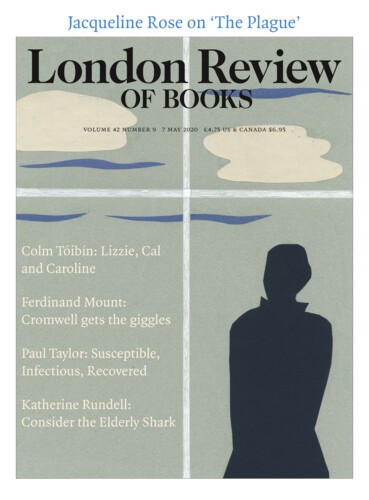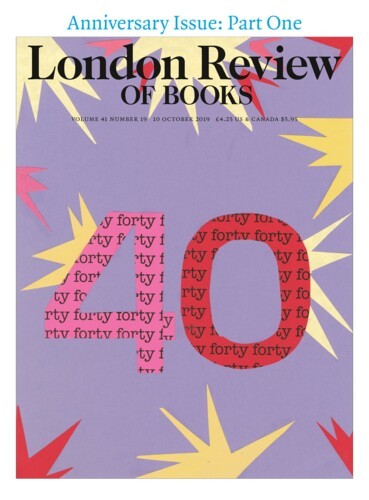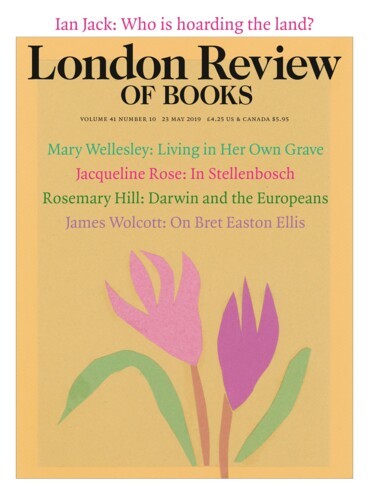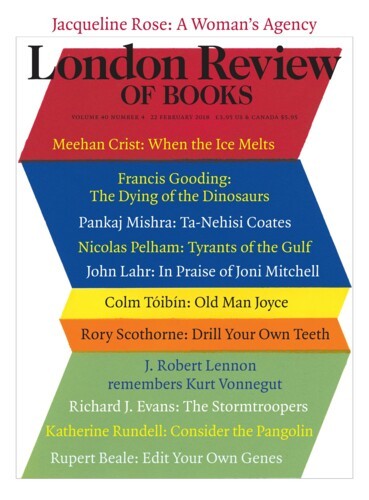Jacqueline Rose
Jacqueline Rose’s novel Two Women will be published in autumn 2026. She is co-director of the Birkbeck Institute for the Humanities.
Pointing the Finger: ‘The Plague’
Jacqueline Rose, 7 May 2020
Ever since the arrival of Covid-19 – in Western Europe, roughly at the end of January – sales of Albert Camus’s The Plague, first published in 1947, have increased exponentially, an upsurge strangely in line with the graphs that daily chart the toll of the sick and the dead. By the end of March, monthly sales of the UK Penguin Classics edition had grown from the low...
Agents of Their Own Abuse: The Treatment of Migrant Women
Jacqueline Rose, 10 October 2019
There is a risk in recounting these stories. To describe what is being done to these women may seem to reinforce their status as victims, embedding them further in an unjust world with no – or only a forced, one-way – exit. Yet not to do so is to be complicit with the women’s invisibility, to cultivate the ‘cultural production of ignorance’ which helps keep national identity in place. Strange undercurrents of fascination pulse through the worst stories of our time. Think of the images of the little girl wailing at the US border; or of three-year-old Alan Kurdi cradled in the arms of the stricken man who in September 2015 discovered his body washed up on a Turkish beach. Or the image of Oscar Alberto Martínez Ramírez and his daughter, not yet two years old, drowned as they tried to cross into the US. The Guardian headlined one of its reports about Alan Kurdi: ‘Shocking images of drowned Syrian boy show tragic plight of refugees.’ ‘Tragic’ and ‘plight’ should give us pause: they make the agony timeless, turn the drowned child into an object of raw pity, obfuscate the human agency, historical choices and wilful political decisions that lead to such outcomes.
One Long Scream: Trauma and Justice in South Africa
Jacqueline Rose, 23 May 2019
Where is trauma meant to lodge itself when the mind, like the body, in shreds or shot to pieces, is no longer anything that might remotely be called home? The very persistence of horror in South Africa tells us that thinking about trauma in relation to language, circling endlessly around the question of whether or not it can be spoken, which has tended to dominate academic discourse, is not enough.
I am a knife: A Woman’s Agency
Jacqueline Rose, 22 February 2018
Reading the stories of sexual harassment both here and in the US, I have started to feel that all the attention has served not only to bolster the urgent call for a better world but, oddly and at the same time, as a diversionary tactic to help us avoid having to think about sex. Or, to put it another way, if harassment and sexual violence are, as a certain version of radical feminism would have it, the whole story of human sexuality, then we may as well lock the door on who we are and throw away the key. How can we acknowledge the viciousness of sexual harassment while leaving open the question of what sexuality at its wildest – most harmful and most exhilarating, sometimes both together – might be?
Podcasts & Videos
Jacqueline Rose discusses her book On Violence and On Violence Against Women with Jude Kelly.
Short Cuts: My Evening with Farage
Jacqueline Rose
Jacqueline Rose reads her piece on the connections between Frank Kermode and Nigel Farage.
Women in Dark Times
Jacqueline Rose
Jacqueline Rose discusses the parallels between Rosa Luxemburg and Marilyn Monroe, with Hilary Harper.
On Freud, Zionism, Sylvia Plath and more
Jacqueline Rose
Jacqueline Rose discusses the full range of her work with Justin Clemens at the 2013 Melbourne Writers Festival.
A Rumbling of Things Unknown: Marilyn Monroe
Jacqueline Rose
Jacqueline Rose asks, for whom or what in 1950s and early 1960s America was Marilyn Monroe carrying the can?
Reading Jacqueline Rose
Jacqueline Rose and Paul Myerscough
Paul Myerscough talks to Jacqueline Rose about her career, from her groundbreaking work on feminism in the 1970s through to her more recent writings on Zionism and the place of fantasy in the world of...
Pieces about Jacqueline Rose in the LRB
Ruthless and Truthless: Rotten Government
Ferdinand Mount, 6 May 2021
Boris Johnson’s japes are comparable in neutralising effect to the softening charm of Tony Blair. How can such a matey, blokey person, ‘someone you could have a pint with’, possess darker, colder...
Protests with Parasols: Proust, Dreyfus, Israel
Michael Wood, 20 December 2012
‘Profonde Albertine’, the narrator writes close to the end of Proust’s novel. By ‘deep’ – profonde – he means ‘unreachable’. She was mostly...
Ruin and Redemption: psychoanalysing Zionism
David Simpson, 23 June 2005
Jacqueline Rose has written a timely and courageous book. One immediate sign of this is its dedication to the late Edward Said, and its rewriting of the title of one of his most important books,
A Mere Piece of Furniture: Jacqueline Rose’s take on Proust
Dinah Birch, 7 February 2002
There are good reasons, and a few bad ones, for lifting minor characters out of famous texts and putting them centre-stage. One bad reason might be that refiguring a large reputation quietly...
Homelessness
Terry Eagleton, 20 June 1996
In the days of F.R. Leavis, English literary criticism was wary of overseas, a place saddled with effete, Latinate languages without pith or vigour. Proust is relegated to a lofty footnote in...
Slick Chick
Elaine Showalter, 11 July 1991
We all know the story. A brilliant, neurotic young American woman poet, studying on a fellowship at Cambridge, meets and marries the ‘black marauder’ who is the male poet-muse of her...
Read anywhere with the London Review of Books app, available now from the App Store for Apple devices, Google Play for Android devices and Amazon for your Kindle Fire.
Sign up to our newsletter
For highlights from the latest issue, our archive and the blog, as well as news, events and exclusive promotions.




